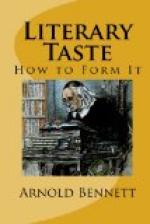This day I shall have to do with an idle, curious man, with an unthankful man, a railer, a crafty, false, or an envious man. All these ill qualities have happened unto him, through ignorance of that which is truly good and truly bad. But I that understand the nature of that which is good, that it only is to be desired, and of that which is bad, that it only is truly odious and shameful: who know, moreover, that this transgressor, whosoever he be, is my kinsman, not by the same blood and seed, but by participation of the same reason and of the same divine particle—how can I be hurt?...
And with these cadences in your ears you go and quarrel with a cabman!
You would be ashamed of your literary self to be caught in ignorance of Whitman, who wrote:
Now understand me well—it is provided in the essence of things that from any fruition of success, no matter what, shall come forth something to make a greater struggle necessary.
And yet, having achieved a motor-car, you lose your temper when it breaks down half-way up a hill!
You know your Wordsworth, who has been trying to teach you about:
The Upholder of the tranquil soul
That tolerates the indignities of Time
And, from the centre of Eternity
All finite motions over-ruling, lives
In glory immutable.
But you are capable of being seriously unhappy when your suburban train selects a tunnel for its repose!
And the A.V. of the Bible, which you now read, not as your forefathers read it, but with an aesthetic delight, especially in the Apocrypha! You remember:
Whatsoever is brought upon thee, take cheerfully, and be patient when thou art changed to a low estate. For gold is tried in the fire and acceptable men in the furnace of adversity.
And yet you are ready to lie down and die because a woman has scorned you! Go to!
You think some of my instances approach the ludicrous? They do. They are meant to do so. But they are no more ludicrous than life itself. And they illustrate in the most workaday fashion how you can test whether your literature fulfils its function of informing and transforming your existence.
I say that if daily events and scenes do not constantly recall and utilise the ideas and emotions contained in the books which you have read or are reading; if the memory of these books does not quicken the perception of beauty, wherever you happen to be, does not help you to correlate the particular trifle with the universal, does not smooth out irritation and give dignity to sorrow—then you are, consciously or not, unworthy of your high vocation as a bookman. You may say that I am preaching a sermon. The fact is, I am. My mood is a severely moral mood. For when I reflect upon the difference between what books have to offer and what even relatively earnest readers take the trouble to accept from them, I am appalled (or should be appalled, did I not know that the world is moving) by the sheer inefficiency, the bland, complacent failure of the earnest reader. I am like yourself, the spectacle of inefficiency rouses my holy ire.




